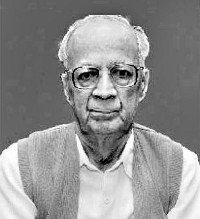 | « Back to article | Print this article |
K Krishnamurty, fondly known among peers as 'KK', an eminent and first-generation macro economist, passed away at his home in Hyderabad on the early hours of November 23. He was 76. He graduated from Andhra University and obtained a doctorate for work on macro econometric modelling from the University of Pennsylvania, under the guidance of later Nobel laureate, Lawrence Klein. After his Ph.D, he joined the Institute of Economic Growth, Delhi, and continued to work on macro modelling.
He graduated from Andhra University and obtained a doctorate for work on macro econometric modelling from the University of Pennsylvania, under the guidance of later Nobel laureate, Lawrence Klein. After his Ph.D, he joined the Institute of Economic Growth, Delhi, and continued to work on macro modelling.
At the Institute, he held the RBI Chair professorship and later served as Director. He also worked at the International Monetary Fund for five years.
After his retirement from IEG, he joined the Administrative Staff College of India, Hyderabad, as visiting professor and continued there till the end.
He was also a past president of the Indian Econometric Society. Krishnamurty's contribution to Indian macro economics is vast. He wrote a number of articles based on model simulations.
His work on 'Inflation and growth: A model for India' in 1984 is a basic reference even today for any macro modelling exercise and very relevant to understand the current growth-inflation tradeoff issue.
In the early 1990s, with V N Pandit of the Delhi School of Economics, he pioneered a macro model for India, under the Global Project LINK supported by UN-DESA, popularly known as the IEG-DSE model.
His foresight may be seen from the model's distinct recognition of the role of infrastructure in overall growth, currently discussed in policy formulations.
Other contemporary issues such as thresholds in fiscal expansion and inflation, crowding-in and crowding-out, etc, were also inbuilt. The IEG-DSE model soon built a reputation as a rigorous exercise and is widely respected in both academia and policy circles. The forecasts derived from this model were extensively used in policy making.
Even after his retirement from IEG, he continued to keep abreast with economic developments and contributed to the model, now known as the India-LINK model, as an advisor.
The long discussions with him before we finalised the forecasts were always enlightening and he was always encouraging with new insights. The last such discussion was less than a week before, when he drew my attention to a piece in a business daily on the risks in achieving 12th Plan growth targets.
Krishnamurty was known for meticulous data reading, which he says that he learnt from his doctoral supervisor, Klein.
Before estimations, he used to look at the data and graphs for a long time and try to understand the factors behind each turning point of the series.
He always sat with his research team and thought aloud regarding data, economic theory and modelling issues. This immensely benefited the young researchers who worked with him.
His presidential address to the Indian Econometric Society on 'Macroeconometric models for India: Past, present and prospects' could have been written only by a person like him, who'd toiled with large data sets (most of the time very noisy), who'd seen through the changes in parameters following fast-changing Indian macroeconomic behaviour, and who'd experienced the impact of changes in the methodology of macroeconomic modelling. In his passing, the Indian macro economics profession has lost a pioneer.
He is survived by wife Malathi, daughter Sandhya and a son, Srinivas.
The writer is an economist at the National Institute of Public Finance and Policy.